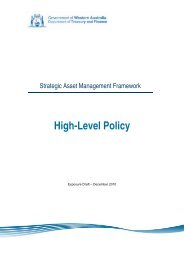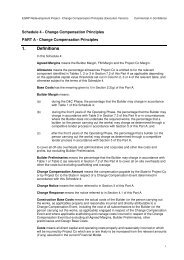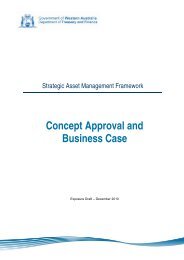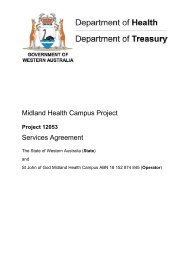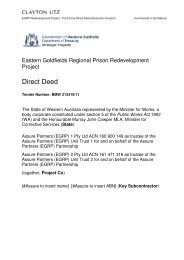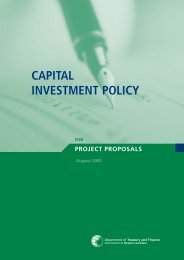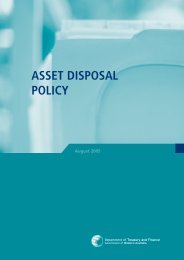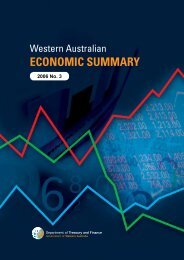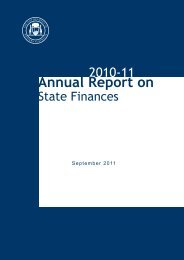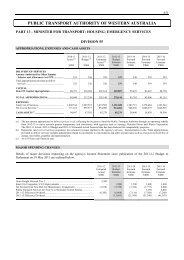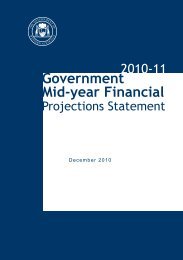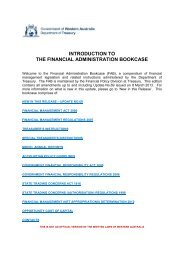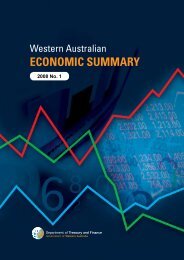Value Mannagement Guidelines - Department of Treasury
Value Mannagement Guidelines - Department of Treasury
Value Mannagement Guidelines - Department of Treasury
- No tags were found...
Create successful ePaper yourself
Turn your PDF publications into a flip-book with our unique Google optimized e-Paper software.
Chapter 1: Introduction<br />
1.1 Background<br />
<strong>Value</strong> Management studies, if conducted and managed well, <strong>of</strong>fer significant benefits that aid the<br />
capital investment process. Equally, if managed poorly, <strong>Value</strong> Management studies can be an<br />
onerous and, ultimately, a fruitless exercise.<br />
The primary purpose <strong>of</strong> this document is to provide guidance on how to maximise the<br />
benefits <strong>of</strong> <strong>Value</strong> Management techniques as part <strong>of</strong> capital procurement (refer to the<br />
Capital Investment Policy). These guidelines highlight to Government agencies not only the<br />
enormous benefits <strong>of</strong>fered by conducting well-managed <strong>Value</strong> Management studies as an integral<br />
part <strong>of</strong> their capital procurement processes, but outline the <strong>Value</strong> Management process in a way<br />
that assists agencies in its use and application.<br />
The <strong>Value</strong> Management <strong>Guidelines</strong> are also intended for use by members <strong>of</strong> the building and<br />
construction industry and other pr<strong>of</strong>essionals, so that they may better understand their role in the<br />
conduct <strong>of</strong> studies, timing, costs and benefits.<br />
Specifically, these guidelines aim to foster an appreciation <strong>of</strong> the process, to show the possible<br />
extent <strong>of</strong> its use, and to draw up procedures for implementing value studies. <strong>Value</strong> Management<br />
techniques are equally applicable to building, civil engineering, and information and<br />
communications technology projects.<br />
1.2 Concept <strong>of</strong> <strong>Value</strong> Management<br />
<strong>Value</strong>, in its broadest sense, is the benefit to the client <strong>of</strong>fered by a project. In this guide, value<br />
means ensuring that the right choices are made about obtaining maximum benefit for the client<br />
within time, cost and quality constraints.<br />
<strong>Value</strong> Management is a process that gives all stakeholders in a proposed development the<br />
opportunity to be involved in the decision-making process. It constitutes an examination <strong>of</strong> all<br />
relevant options for the design and construction <strong>of</strong> the project, leading to a refinement <strong>of</strong> the<br />
design brief and identification <strong>of</strong> any budget constraints.<br />
<strong>Value</strong> Management is a structured, systematic and analytical methodology that seeks to achieve<br />
the essential functions <strong>of</strong> a project at the lowest total cost, consistent with required levels <strong>of</strong><br />
performance and quality. The underlying assumption to <strong>Value</strong> Management is that there are<br />
always many ways to achieve any function, and that an examination <strong>of</strong> alternatives may produce<br />
a better-value solution.<br />
<strong>Value</strong> Management concentrates on the actual needs <strong>of</strong> the user to focus its resources. It is<br />
different to cost-cutting exercises, which achieve economies by using less or cheaper materials.<br />
The <strong>Value</strong> Management approach involves the use <strong>of</strong> creative techniques, combined with the<br />
latest technical information on materials and construction methods.<br />
1



